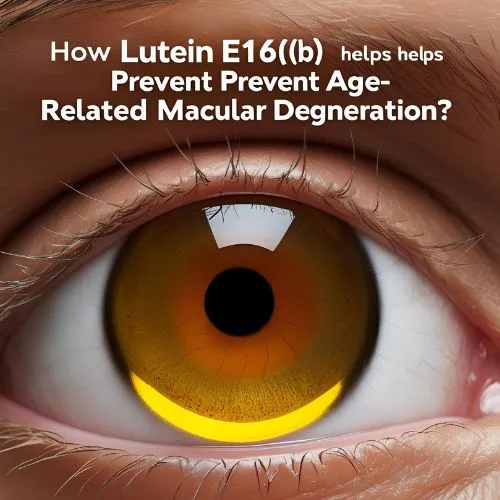Is Lutein E161(b) Effective for Preventing Age-Related Blindness?
As we age, our eyes become more susceptible to various conditions that can impair vision or even lead to blindness. One of the most common age-related eye problems is age-related macular degeneration (AMD), which affects millions of seniors worldwide. In recent years, researchers have been exploring the potential of lutein E161(b), a natural carotenoid pigment, in preventing and managing AMD and other age-related eye conditions. This article delves into the effectiveness of lutein E161(b) in maintaining eye health and preventing age-related blindness.

How Lutein E161(b) Helps Prevent Age-Related Macular Degeneration?
Lutein E161(b) is a powerful antioxidant that accumulates in the macula, the central part of the retina responsible for sharp, detailed vision. This carotenoid plays a crucial role in protecting the eyes from oxidative stress and harmful blue light. Here's how lutein E161(b) contributes to preventing age-related macular degeneration:
Antioxidant Protection
Lutein E161(b) acts as a potent antioxidant in the eye, neutralizing harmful free radicals that can damage delicate eye tissues. By reducing oxidative stress, lutein helps maintain the integrity of the macula and retina, potentially slowing down the progression of AMD.
Blue Light Filtration
One of the unique properties of lutein E161(b) is its ability to filter out high-energy blue light. This type of light, emitted by digital devices and LED lighting, can penetrate deep into the eye and cause photochemical damage to the retina. By absorbing blue light, lutein acts as a natural sunscreen for the eyes, reducing the risk of light-induced oxidative damage.
Macular Pigment Density
Lutein E161(b) is a key component of the macular pigment, which protects the central retina. Higher macular pigment density has been associated with better visual function and a reduced risk of AMD. Regular consumption of lutein-rich foods or supplements can help increase macular pigment density, potentially offering better protection against age-related eye diseases.

Does Lutein E161(b) Reduce the Risk of Vision Loss in Seniors?
The question of whether lutein E161(b) can effectively reduce the risk of vision loss in older adults has been the subject of numerous studies. While research is ongoing, several findings suggest that lutein supplementation may indeed have a protective effect on eye health in seniors.
Impact on Visual Function
Studies have shown that lutein E161(b) supplementation can improve various aspects of visual function in older adults. These improvements include:
- Enhanced contrast sensitivity
- Improved glare recovery
- Better visual acuity in low-light conditions
- Reduced visual fatigue
These benefits can significantly impact the quality of life for seniors, allowing them to maintain independence and engage in daily activities with greater ease.
Slowing AMD Progression
While lutein E161(b) may not completely prevent AMD, research suggests that it can slow down the progression of the disease in its early stages. A landmark study, the Age-Related Eye Disease Study 2 (AREDS2), found that adding lutein and zeaxanthin to a formulation of antioxidants and minerals reduced the risk of progression to advanced AMD by 10% over five years.
Cataract Prevention
In addition to its effects on AMD, some studies have indicated that lutein E161(b) may also play a role in reducing the risk of cataracts, another common age-related eye condition. The antioxidant properties of lutein may help protect the lens from oxidative damage, potentially delaying the onset or progression of cataracts.
Scientific Evidence on Lutein E161(b) for Eye Health
The efficacy of lutein E161(b) in promoting eye health and preventing age-related vision loss has been the subject of extensive scientific research. Here's an overview of some key findings:
Clinical Trials and Meta-Analyses
Numerous clinical trials have investigated the effects of lutein E161(b) supplementation on various aspects of eye health. A meta-analysis of these studies published in the Journal of the American Medical Association Ophthalmology found that lutein and zeaxanthin supplementation was associated with a significant reduction in the risk of late AMD. The analysis also showed improvements in visual acuity and contrast sensitivity in individuals with early AMD.
Dosage and Bioavailability
Research has also focused on determining the optimal dosage and bioavailability of lutein E161(b) for eye health benefits. Studies suggest that a daily intake of 6-10 mg of lutein may be sufficient to increase macular pigment density and improve visual function. However, factors such as individual metabolism, diet, and overall health status can influence the effectiveness of lutein supplementation.
Long-Term Effects
While many studies have shown promising short-term results, long-term research on the effects of lutein E161(b) supplementation is still ongoing. The Lutein Antioxidant Supplementation Trial (LAST II) followed participants for three years and found sustained improvements in visual function with continued lutein supplementation. However, more extended studies are needed to fully understand the long-term impact of lutein on preventing age-related blindness.
Combination with Other Nutrients
Research has also explored the synergistic effects of lutein E161(b) when combined with other nutrients. For example, the combination of lutein with zeaxanthin and omega-3 fatty acids has shown promising results in supporting overall eye health and potentially reducing the risk of AMD progression.

Conclusion
In conclusion, while more research is needed to fully understand the extent of lutein E161(b)'s effectiveness in preventing age-related blindness, the existing evidence is encouraging. Lutein E161(b) appears to play a significant role in maintaining eye health, particularly in protecting against age-related macular degeneration and improving visual function in older adults. As with any supplement, it's essential to consult with a healthcare professional before adding lutein to your regimen, especially if you have existing eye conditions or are taking medications.
For those interested in learning more about lutein E161(b) and other natural plant extracts for eye health, Yangge Biotech Co., Ltd. offers a wide range of high-quality ingredients backed by scientific research. To explore innovative solutions for your products, please contact us at info@yanggebiotech.com.
References
1. Age-Related Eye Disease Study 2 Research Group. "Lutein + zeaxanthin and omega-3 fatty acids for age-related macular degeneration: the Age-Related Eye Disease Study 2 (AREDS2) randomized clinical trial." JAMA, 2013.
2. Bernstein, P.S., et al. "Lutein, zeaxanthin, and meso-zeaxanthin: The basic and clinical science underlying carotenoid-based nutritional interventions against ocular disease." Progress in Retinal and Eye Research, 2016.
3. Ma, L., et al. "Effect of lutein and zeaxanthin on macular pigment and visual function in patients with early age-related macular degeneration." Ophthalmology, 2012.
4. Ranard, K.M., et al. "Dietary guidance for lutein: consideration for intake recommendations is scientifically supported." European Journal of Nutrition, 2017.
5. Stringham, J.M., et al. "Macular pigment and visual performance under glare conditions." Optometry and Vision Science, 2008.

Based on your location and order quantity, you will have the opportunity to receive a limited time free shipping promotion!

Who we are


